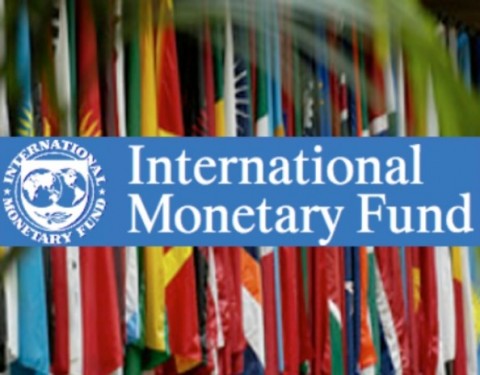Increase In Oil Production Will Lift Nigeria’s Economic Growth – IMF
Featured, Latest Headlines, News Across Nigeria Wednesday, July 28th, 2021
(AFRICAN EXAMINER) – International Monetary Fund (IMF) has said that its forecast on expected increase in oil production in Nigeria amidst the current economic challenges, will lift the country’s growth in 2022.
This was disclosed in a statement issued at the end of the Press Conference for the IMF’s World Economic Outlook Update on Tuesday.
The conference was moderated by IMF’s Senior Communications Officer, Jennifer Beckman, with Gita Gopinath, IMF’s Chief Economist and Director of the Research Department, Petya Kovea-Brooks, IMF’s Deputy Director, Research Department, and Malhar Shyam Nabar, IMF’s Division Chief, Research Department in attendance.
IMF said the projection is predicated on continued improvements in external financial conditions, which have, despite some bouts of volatility recently, have actually been fairly supportive of growth, and it’s important that that continues in order for this growth forecast to pan out.
“In terms of our forecast for Nigeria this year, we have maintained an unchanged forecast of 2.5 percent. And we have upgraded slightly for 2022, to 2.6 percent. The reason for the unchanged forecast for this year is because it’s a product of opposing developments.
“We saw activity, as elsewhere, respond a lot stronger than what we had expected earlier in the year. But looking out ahead, we think that the uptick in cases in the rest of the continent is going to pose a downside risk factor and is going to drag on growth going forward”, the statement said.
The statement also noted that part of IMF’s upgrade for 2022, indicated some degree of improvements in terms of trade for Nigeria.
It added that Nigeria has been a beneficiary of IMF funding, noting that the West African country accessed the Fund’s emergency financing facilities last year.
“That is also contributing to this outlook by alleviating some of the liquidity needs that the Nigerian economy has faced”, the statement further explained.
The statement equally acknowledged the resilience of the Egyptian Economy, particularly in the face of the significant shock that it has experienced.
“When it comes to inflation, Egypt is a country where we are seeing now inflation at around 4.9 percent, if we recall the most recent numbers. And the inflation target had actually been reset to be now at about 7, with a band of 2 around it. So, then you look at it this way, actually inflation is at the lower end of the inflation and inflation band.
“So, more generally, our recommendation is to continue the data-driven approach to monetary policy, which is something that the Central Bank has been doing over the past months”, it added.
The statement stressed that the phenomenon of inflation that is being seen in emerging markets and developing economies are caused by a combination of factors, including their currency weakening, adding that several of these countries have actually started raising interest rates because of the concern that these inflation pressures could become persistent.
It also observed that inflationary pressures are increasingly pervasive in emerging and developing economies, unlike that of the advanced economies.
“In emerging and developing economies, we are seeing this show up and markets are expecting that interest rates will go up, actually, much faster than in the advanced economies”, the statement stressed.
The statement observed that the emergence of highly infectious variants of COVID-19 could derail the recovery and wipe out $4.5 trillion, cumulatively, from global Gross Domestic Product (GDP), by 2025.
It added that financial conditions could also tighten abruptly, if there is a sudden reassessment of the monetary policy outlook, especially in the United States, noting that a worsening pandemic and tightening financial conditions would inflict a double blow to emerging markets and developing economies and severely set back their recoveries.
The statement noted that multilateral action is needed to ensure rapid worldwide access to vaccines, diagnostics, and therapeutics. This, according to the statement, would save countless lives, prevent new variants from emerging, and add trillions of dollars to global economic recovery.
Meanwhile, the IMF staff’s proposal to end the pandemic, which was jointly endorsed by the World Health Organization, the World Bank, and the World Trade Organization, sets a goal of vaccinating at least 40 percent of the population, in every country, by the end of this year, and at least 60 percent by the middle of next year, alongside ensuring adequate diagnostics and therapeutics, at the price of $50 billion.
To achieve these targets, at least one billion vaccine doses should be shared in 2021 by countries with surplus vaccines, and vaccine manufacturers should prioritize deliveries to low and lower-middle income countries.
It is therefore important to remove trade restrictions on vaccine inputs and finished vaccines and make additional investment in regional vaccine capacity to ensure sufficient production.
In addition, a related priority is to ensure that financially constrained economies maintain access to international liquidity. To ensure this, major central banks should clearly communicate their outlook for monetary policy and ensure that inflation fears do not trigger rapid tightening of financial conditions.
“A general allocation of special drawing rights, equivalent to $650 billion, as proposed by the IMF, should be completed quickly, so as to provide liquidity buffers for countries and help them address their essential spending needs.
“Greater action is needed to ensure that the G20 common framework successfully delivers on debt restructuring for countries where debt is already unsustainable. Now, the other major shared challenge is to reduce carbon emissions and slow the rise in global temperatures to avoid catastrophic health and economic outcomes.
“This requires a multipronged strategy with carbon pricing as a centerpiece, coupled with green infrastructure push and subsidies for research into green technologies. All of this will be needed to lower carbon dependence. So far, only 18 percent of recovery spending has been on low carbon activities, and much more will be needed”, it further suggested.
The statement recommended that policy effort at the national level should continue to be tailored to the stage of the pandemic, first, to escape the acute crisis by prioritizing health spending, including for vaccinations and targeted support for affected households and firms.
It added that such policies should also be aimed at securing the recovery with more emphasis on broader fiscal and monetary support, depending on available space, including remedial measures to reverse the loss in education, and to invest in the future by advancing long-term goals of boosting productive capacity, accelerating the transition to lower carbon dependence, harnessing the benefits of digitalization, and ensuring the gains are equitably shared.
“The recovery is not assured until the pandemic is beaten back, globally. Concerted, well-directed policy actions at the multilateral and national levels can make the difference between a future where all economies experience durable recoveries or one where divergences intensify, the poor get poorer, and social unrest and geopolitical tensions grow”, the statement further suggested.
Related Posts
Short URL: https://www.africanexaminer.com/?p=65915






















